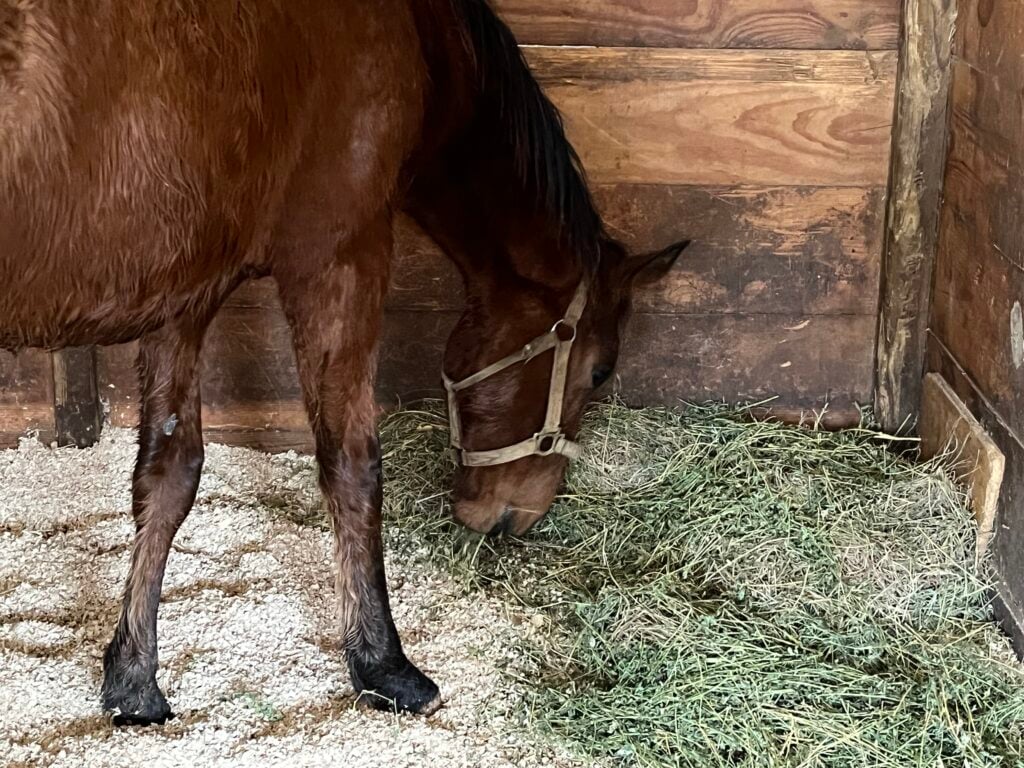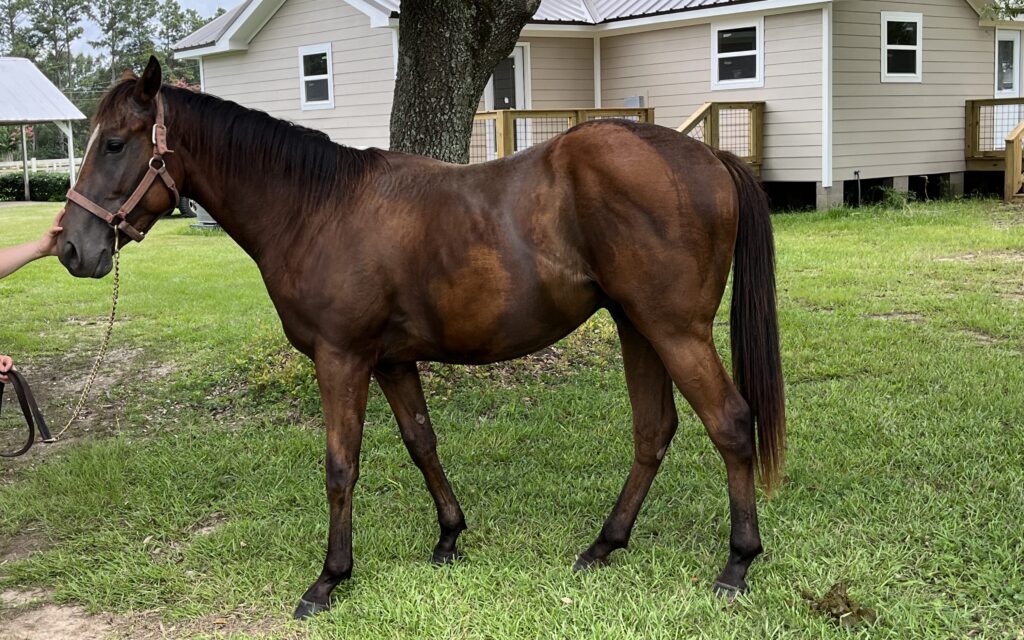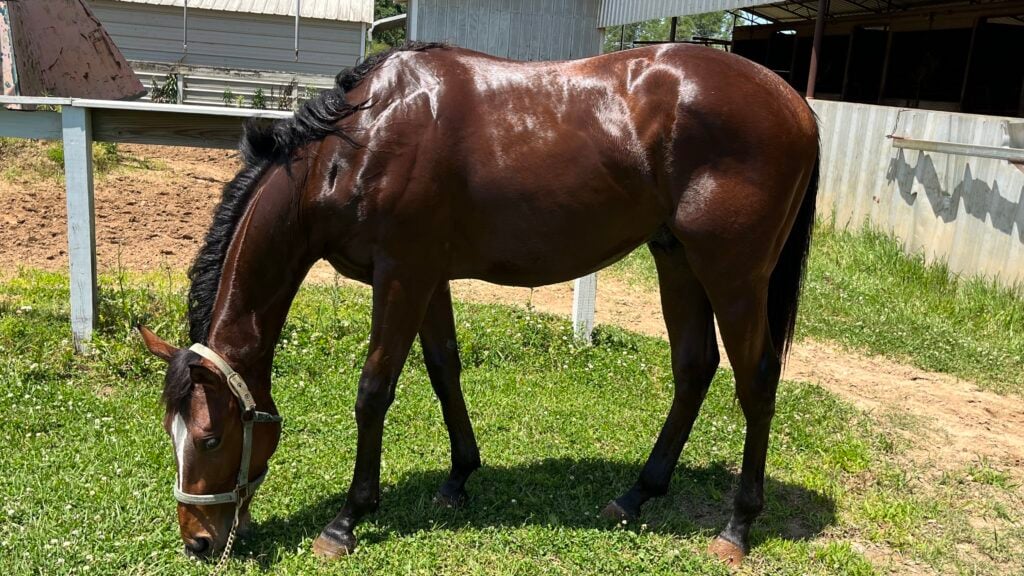How Often Do You Need to Feed Your Horse in Red Dead Redemption 2
Any links on this page that lead to products on Amazon are affiliate links and I earn a commission if you make a purchase. Thanks in advance – I really appreciate it!
Should I feed my horse once or twice a day? I often get asked this question, and it's not easily answered. There are basic horse feeding principles, but you have to be flexible because some horses' dietary needs are different than others.
Feeding a horse grain once a day is fine, but horses need a steady supply of forage throughout the day to maintain their health. If your horse is kept in a stall, it's best to feed it hay twice a day in a slow feeder.
Whether you feed your horse once a day or twice, you have to know how long their food will last and plan their next meal accordingly. You also need to keep in mind that horses don't always stop eating when they're full. Let's learn more below.

Is it okay to feed a horse once a day?
When discussing whether or not to feed a horse once or twice a day, it depends on whether we are talking grain or hay. For our horses, we bring them in from the pasture and feed them grain, then turn them out after they finish.
Feeding horses grain once a day, twice a day, or not at all is acceptable and depends primarily on your horse's individual needs. Horses with a problem getting enough protein or vitamins from their forage may need a grain supplement.
Also, horses that work hard burn a lot of calories and benefit from the extra calories in grain. But it's essential horses are not fed too much grain at one time because they don't digest it efficiently.
Generally, most horses do well grazing on high-quality grass pastures and hay and don't need grain. If your horse relies on you to supply forage because it's kept in a stall, paddock, or bare pasture, it's best to feed your horse twice a day.
Most people are reluctant to feed their horses just once a day, and I'm one of those people. However, feeding a horse once a day is acceptable if done correctly.
If you feed your horse once a day, make sure that they can't finish their food in less than 12 to 14 hours. The best way to do this is to use a slow feeder like a hay net or hay bag. These devices force the horse to eat slowly and in a style that imitates its natural grazing habits.
Besides using a hay net, you can also provide your horses with a continuous food source like a bale of hay. A 60 pounds bale for one horse would be enough to last for five days.
However, feeding your horse just once a day might not work for every horse, especially if your horse is an energetic eater and eats through its feed very quickly.
I find for horses that graze regularly but need an extra boost, giving them a flake or two of alfalfa hay once a day is beneficial because it provides protein and extra calories.
Remember that each horse reacts differently to different feeding schedules. If you want to change to a specific feeding style, it's best to make subtle changes in the horse's diet and keep a watch on its physical and emotional health.

How much grain to feed a horse per day?
Feeding horses grain is often thought of as a necessary evil. It can help them to bulk up and provides essential nutrients, but it can also be difficult for them to digest.
As a result, many horse owners choose to feed their horses grain in multiple smaller meals throughout the day. This allows the horse's digestive system to break down the food more slowly and prevents large fluctuations in blood sugar levels.
In addition, feeding horses grain in multiple small meals helps to reduce the risk of colic, a potentially deadly condition that can occur when undigested food accumulates in the horse's intestine.
As any horse owner knows, the health of their animal is paramount. By feeding grain in smaller meals throughout the day, they can help to ensure that their horse stays healthy and happy.
Here are some helpful tips:
- Adjust the amount of grain you feed based on your horse's activity level
- Feed at approximately the same time each day.
- Only feed grain mixes that are specifically made for horses.
- Never feed more than .5% of your horse's body weight in grain per feeding; for a 1,000 lb. horse, this would be 5 lbs. (.005 x 1,000= 5)

How long can a horse go between feedings?
It's essential horse owners understand why it's necessary or not to feed their animals on a schedule. To begin with, a horse's digestive system is nothing like humans. They need to take in food slowly but consistently over time. Which raises the question, how long can they go without eating?
Horses can go six to eight hours between feedings without a risk of developing dangerous health conditions. An empty stomach can also prompt your horse to eat unhealthy stuff like mold or even small dead animals.
Horses in the wild typically roam until they find good-looking grass and graze on it slowly. They then wander along, take a short nap, and repeat the cycle. Domesticated horses follow this pattern in pastures.
Horses graze because they have small stomachs relative to their body, so to meet their dietary needs, they have to take in small portions over an extended period. And, unlike humans, their stomachs can't stretch very much, so horses that overeat can colic or develop other issues like choke and laminitis.
It is also essential that your horse has plenty of clean water at all times. Several dehydration symptoms like lethargy, muscle weakness, depression, and colic can show in a matter of hours. Though horses are predicted to survive weeks without eating anything, they will die in three to five days of no water.

Can you overfeed a horse?
A neighbor recently over-fed his horse and the poor animal developed colic as a result. It made me think about how horses get over-fed and wonder why horses tend to overeat.
You can overfeed a horse in many different ways. For instance, if you abruptly shift from a scheduled feeding plan to free-feeding, allowing it to eat cut grass, giving the horse too much grain, or it isn't getting the necessary amount of exercise to digest its food.
Horses have constant access to food in the wild, so it seems to make sense that they would know when to stop eating. However, grazing horses burn calories roaming around searching for grass, and then they slowly pull it from the ground before they can take another bite. This method of eating keeps them from overeating.
Similarly, a horse grazing in the wild might travel up to 20 miles a day and digest a fair amount of its food in the process. In contrast, a horse locked up in a paddock eating the same amount of hay doesn't burn the same amount of calories and cannot digest its food as efficiently.
If your horses are used to being fed at certain times of the day, they will probably lose their ability to self-regulate their eating behavior. When it's feeding time, they are hungry and assume that the next meal would be hours from now. So they are likely to gobble up whatever you give them and overeat.
If you decide to shift your horse's feeding practice from a scheduled feeding plan to free-range, do so slowly. Read more in my article about the essential equine feeding guide.
Generally speaking, horses on a regular hay feeding routine will stop eating when it's full. However, suppose you include a protein or mineral-rich forage like alfalfa or beet pulp in their diet. In that case, they need physical exercise to assist in digestion and prevent overfeeding on one nutrient or another properly.
Horses are also attracted to food rich in sugar, including grains and cut grass (which is never recommended as a significant part of a horse's diet). Many horses won't stop eating even when full because of the sweetness in the food.

What times should I feed my horse?
My niece asked me if there was an ideal time she should feed her horse each day. It made me think if managing a strict dietary routine is as important for horses as for humans.
If you feed your horse twice a day, you should feed it after 12 or so hours. If you feed your horse small meals more than twice a day, you should feed it around dawn every day, and all the successive meals should be no more than four to six hours apart.
The best equine eating plan is to allow horses free forage. However, that's not an option for many people who may not have available pastures or those with a sport or draft horse that requires a specifically supervised diet. So, if you prefer a routine-based feeding practice, consistency is critical.
Feed your horse a fixed amount of feed and hay at equal intervals. This way, your horse will not only know when to expect food, but its body will also become accustomed to the pattern and digest food more effectively.
We are trying to put weight on a young horse and are feeding it a small amount of grain, top-coated with a weight builder supplement three times a day, morning, noon, and evening. In combination with the feeding plan, we are incorporating regular exercise.
Finally, there are some times when you should never feed your horse – for instance, feeding a horse shortly before or after riding is not good if the diet consists solely of grain.

5 Horse feeding tips:
- Only feed grain if necessary and then keep it limited
- Feed an ample supply of forage; horses typically consume approximately 2% of their body weight in hay or grass.
- Don't make sudden changes to your horses' diet. Introduce new food slowly.
- Keep an eye on your horses' weight; the number of calories, minerals, protein, and fat changes as they age and work.
- Always provide free access to clean water.
Below is a helpful YouTube video about feeding horses.
FAQ
How much grain should you feed a horse?
The amount of grain you feed depends on the amount of work your horse is doing plus its size. For an active horse weighing 1,000 pounds, you should feed it about 9 pounds of grain per day in combination with high-quality hay.
Horses that eat too much grain can get severely ill, so be careful and don't overfeed grain. One rule of thumb is to never give your horse more than 11 pounds per day regardless of their workload.
Should horses have hay all time?
Horses' bodies work optimally when they eat hay regularly. Horses are grazing animals, and their digestive tracts are designed to process small amounts of food. They constantly secrete stomach acid and are at risk of developing ulcers if they don't eat forage.
Source: https://horseracingsense.com/is-better-to-feed-horse-once-or-twice-a-day/